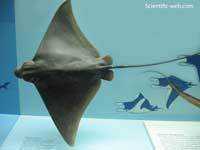The spotted eagle ray, Aetobatus narinari, Euphrasen (1790), or bonnet ray, is a cartilaginous fish found in shallow coastal water by coral reefs and bays, in depths down to 80 meters (260 feet).[1] They can be found globally in tropical regions, including the Gulf of Mexico, Hawaii, Atlantic Africa, the Indian Ocean, Oceania, and the Pacific west coast of the Americas. The spotted eagle ray can be identified by its numerous white ringed spots on its blue dorsal surface, white ventral surface, long, whip-like tail, and distinctive head that somewhat resembles a bill. It preys mainly upon bivalves, shrimps, crabs, whelks, and other benthic infauna. The spotted eagle ray's specialized chevron-shaped tooth structure helps it crush the hard shells of mollusks. The largest specimens can grow up to a maximum wingspan of 3 m (10 ft) and a mass of 230 kg (500 pounds).[1][2] It has a notably long tail in relation to other rays; the total length of a mature ray can reach 5 m. It can have up from 2-6 venomous spines on the tail, however, it does not pose a significant threat as it generally avoids human contact. A. narinari develops ovoviviparously — the eggs hatch internally and feed off a yolk sac prior to birth.
Retrieved from "http://en.wikipedia.org/" |
|

